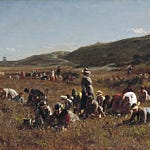Which of us, when we were children, did not have a place that was secret — our Word of the Week? Tom Sawyer and his friends met in a strange cave by the great river, with a small and hidden entrance that after fifty feet or so opened out into a big underground room. That’s where they decided to be Pirates of the Spanish Main, and to rob people and kidnap beautiful ladies and other such exciting things, all according to the swashbuckling romances that Tom was reading. Of course it was a secret club, bonded with blood and oaths, as boys will invent.
People who commit crimes want to keep things secret — no surprise, there, and the words themselves are cognate, coming to us through Latin. The ancient Indo-European root krei- has to do with sifting, separating, making distinctions or judgments, and that applies to both words. A hypocrite is a play-actor, and in a play you’ve got to separate one player from another; and that word too is a cousin, as is the word critic, both coming from the Greek. The critic says, “Rose Marie and Louis Armstrong belong in that category of people who have lousy voices, but are superb singers nonetheless.” He sifts, he separates out.
One day, in the sixth grade, Sister Carmine of happy memory, very smart and stern but a genuine teacher and brave and big-hearted, caught sight of some strange language on my notebook, and asked me what it was. I was abashed, and didn’t want to say. She called me up to the front of the room so that the rest of the class didn’t hear, and asked again. “It’s a code,” I said. “Will you tell me what it means?” she asked. I said I’d rather not. It wasn’t that I’d said anything bad, but it was just my secret, my private little hobby. I kept changing it, tinkering with it, making exceptions, adding grammatical markers, working around with it so that you could actually pronounce the words, but if you knew the basic secret of it you could reconstruct at least a part of the original; not that it would make a whole lot of sense, though, because only I knew what all the tinkerings did. I still remember most of it: Ov tisho: I’ll see it.
But there is something deeply human, and not at all wrong, about having a secret. Again, when I was a small boy, my cousins and I found an abandoned stone foundation in the woods, about four feet high and seven or eight feet square, and we decided we’d roof it over with tree limbs and make a “fort” out of it. It was our secret. Then a couple of older boys went snooping for it, found it, and wrecked it. We didn’t build it back up. Still, I went there often, to sit and think, and a hundred yards away was the great steep scree of rocks and coal where I went alone to find fossils. I kept the ones I liked best, 153 of them, sometimes covered over with many imprints, and with strange shadings of rainbow-color now and then, such as you see on wet slate when the sun shines on it, or in a spill of oil on the road. It was my secret, right out in the open; secret because nobody else knew what was there, hidden inside the stones. To be a human being is to have an interior life, self-knowing (and sometimes self-hiding or self-pretending); and there are things you will say only to someone you love, and maybe only the one person in the world you love best, your husband or your wife; or maybe only to God. That’s not because you’re hiding, but because there are depths within us that only love can sound. And Jesus went to the mountains to pray.
There are two parts to the Latin secernere, to distinguish, to sift. One is the root, which I’ve noted above. The other is the prefix se-. One day, I was at the big dictionary in our school library, looking up the word seclude, because I wanted to know what the prefix meant, and Sister Carmine came up behind me and asked what I was wondering about. She didn’t do such things very often — hardly at all, really. But again I was shy. “Nothing,” I said. Only later on did I learn that the prefix suggests that you’ve separated something to be by itself: other words in English that have the same prefix from Latin include separate, seduce, select, severe, secede. And English self, from the Germanic branch, is also a cousin. But back to the root: Indo-European krei(n)-, suggesting a sieve (which is what you sift things in), became Germanic hrid-, to shake. That initial hr-, still pronounced in Old English, was reduced to r- in Middle English, so we get an old-fashioned word that means sieve, a thing you shake back and forth to separate one thing from another: a riddle. No, that’s not the verbal puzzle — and the one riddle (the sieve) is no relation to the other riddle (the trick with words). But if you didn’t know the noun, you certainly know the verb: to riddle, as in to punch something full of holes! Literally, to riddle something with holes is to make a sieve out of it. Alas, then all your secrets might fall out. But that’s what you need secret panels for, or hollows high up in trees, and then you wait for the one person to whom you will show that special place.
Listen to this episode with a 7-day free trial
Subscribe to Word & Song by Anthony Esolen to listen to this post and get 7 days of free access to the full post archives.












